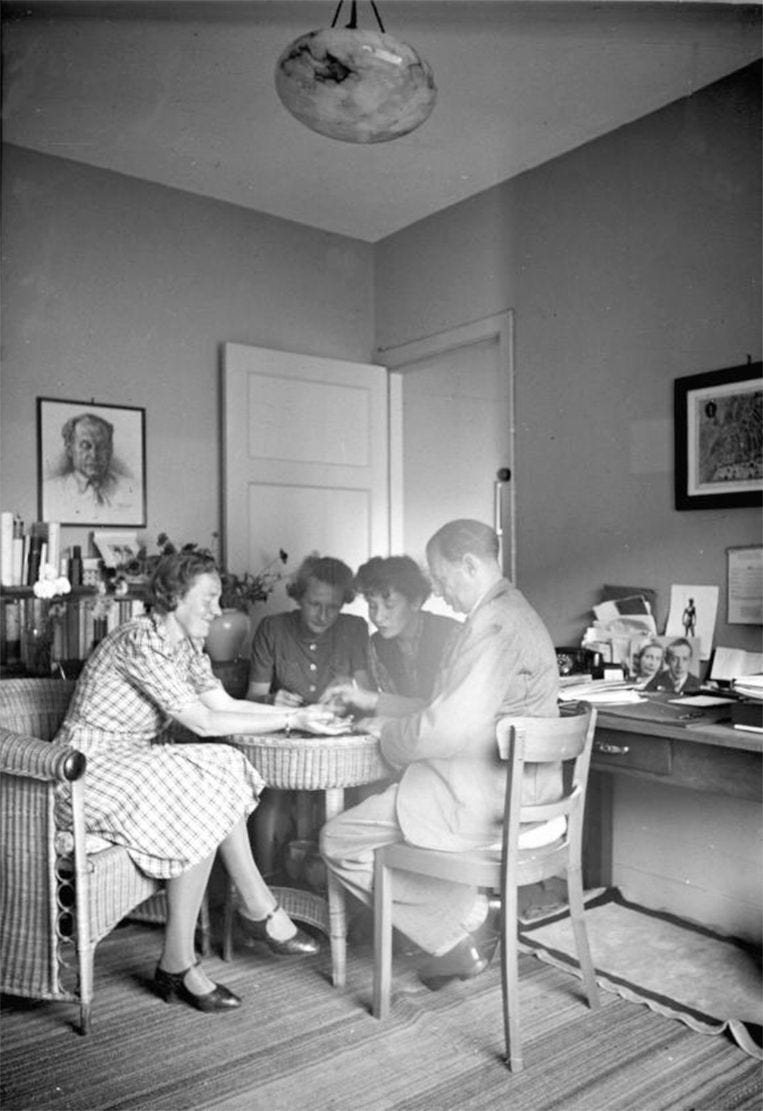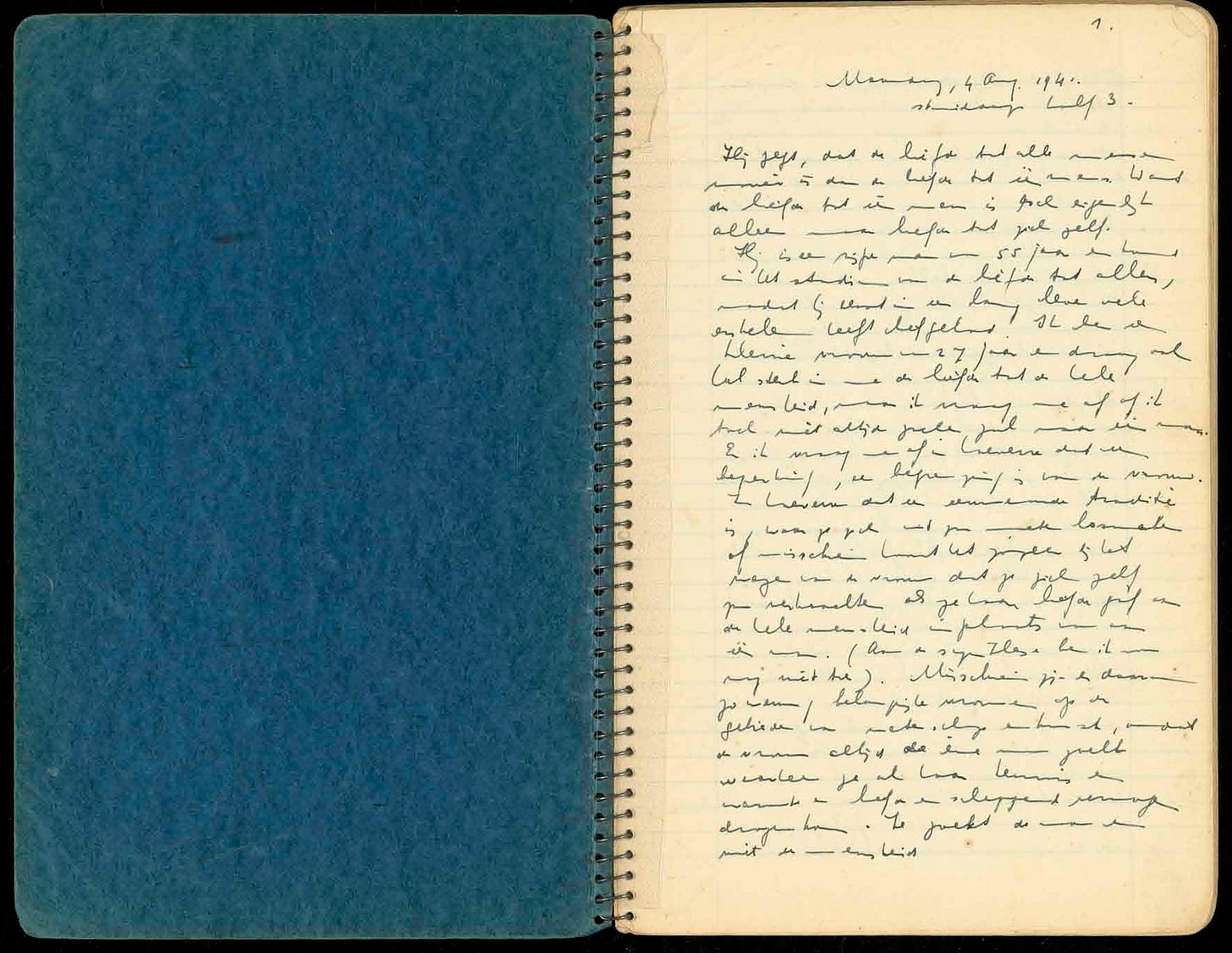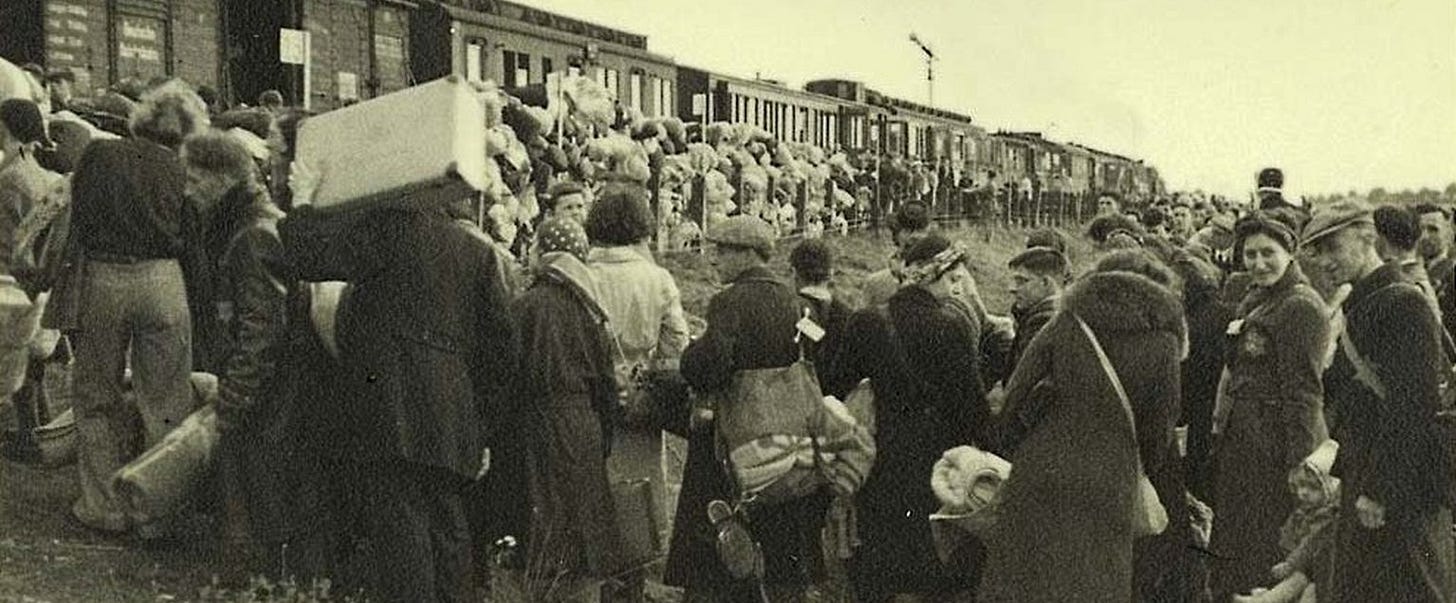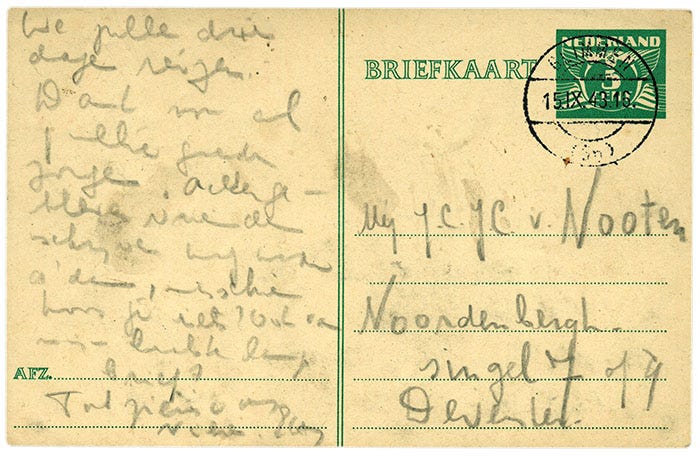Sometimes when I stand in some corner of the camp, my feet planted on earth, my eyes raised towards heaven, tears run down my face, tears of deep emotion and gratitude…these two months behind barbed wire have been the richest and most intense of my life, in which my highest values were so deeply confirmed.
Advent Day 10: Etty Hillesum (1914-1943)
Have you ever felt intensely humbled when learning about someone’s life story? People like Harriet Tubman, Oscar Romero, or Martin Luther King? Or maybe someone you know who, despite—perhaps even because of—extremely difficult circumstances was so utterly grounded that they have the ability to act in ways that seem almost superhuman?
Etty Hillesum is one such person.
Etty was born in 1914 to a secular Dutch-Jewish family. Her parents and brothers were brilliant intellects and artists, but each was troubled by mental illness. At eighteen, to escape her family’s chaotic madhouse, she moved to Amsterdam. There, she studied law while living a typical cosmopolitan lifestyle: enjoying a diverse group of friends, partaking of the city’s cultural offerings, hanging out at cafes, and falling in and out of love. Etty’s dream was to become a writer. But in 1940 her world was turned upside-down when Germany invaded Holland.
In the first months of the occupation, struggling with the stress of life under Nazism, Etty sought out therapist Julius Spier. Spier introduced Etty to meditation and prayer and assigned her spiritual reading: the Psalms, the Gospel of Matthew, Augustine’s Confessions, the novels of Dostoevsky, poetry of Rilke, and the Christian mystics. These practices and sacred texts had a profound effect on Etty, allowing her to access a depth dimension of her inner life that up to that point she hadn’t known existed. When Spier realized that Etty was in the throes of a mystical awakening, he gave her another instruction: write.
In March 1941, Etty began the first of what would become nine volumes of journals, documenting her transformation from what Fairfield University’s Francis Hannafey calls a narrow, individualistic moral worldview to an intensely other-directed ethic.
Etty had found firm footing at the core of her inner being, the space Teresa of Avila referred to as her interior castle. In this God-filled place, Etty tapped into a deep well of love, empathy and forgiveness. This well became a source of sustenance and grit, not only for Etty, but for countless others who came into contact with her in the tragic times ahead.
By 1942, Dutch Jews were forbidden from holding most jobs, riding public transport, visiting public parks, even shopping in grocery stores. At this time, Etty was offered an escape from Holland. When she refused, a friend and his daughter hatched a plan to kidnap her and hide her in safekeeping until the war was over. Etty talked them out of it. Rather than running away, she found her life’s purpose in offering herself as a vessel of hope in a hopeless world.
I don’t think I could feel happy if I were exempted from what so many others have to suffer…Whatever I may have to give to others, I can give it no matter where I am, here in the circle of my friends or over there, in a concentration camp.
As roundups intensified, Etty took a job as a typist with the Jewish Council which mediated between the occupying Nazis and the Jewish community. But when a social work position became available at Westerbork, the overcrowded camp where Dutch Jews were imprisoned before being shipped to Auschwitz, she asked to be assigned there. In her journals and letters, Etty bore unflinching witness to the fullness of the Nazi plan, the suffering it caused, and the response she would have to it.
…what is at stake is our impending destruction and annihilation…They are out to destroy us…we must accept that and go on from there…I continue to live with the same conviction and I find life meaningful…Ultimately, we have just one moral duty, to reclaim large areas of peace in ourselves, more and more peace, and to reflect it toward others.
Amid the horror, her sense of God in and around her increased. The intensity of this mystical experience often drove her to her knees in prayer.
God, take me by Your hand, I shall follow You faithfully, and not resist too much, I shall evade none of the tempests life has in store for me, I shall try to face it all as best I can….I shall try to spread some of my warmth, of my genuine love for others, wherever I go….I know that I must seek You amongst people, out in the world. And that is what I shall do….I vow to live my life out there to the full.
Etty became famous at Westerbork as a ray of light in a world gone dark with hatred. She wanted, she said, to become the thinking heart of the barracks. Whenever and wherever she could, she offered a smile, a touch, a song. She gave comfort in the most desperate hour of people’s lives, helping them find God in themselves. Quite simply, she made of her life a prayer.
Sometimes I sit down beside someone, put an arm around a shoulder, say very little and just look into their eyes. I am not afraid to look suffering straight in the eyes...and that’s when my task begins. It is not enough simply to proclaim You, God. One must also clear the path toward You in them…and to do that one has to be a keen judge of the human soul. Ties to father and mother, youthful memories, dreams, guilt feelings, inferiority complexes, and all the rest block the way. I embark on a slow voyage of exploration with everyone who comes to me. . . . Sometimes they seem to me like houses with open doors. . . . I promise that I shall try to find a dwelling and a refuge for You in as many houses as possible. There are so many empty houses, and I shall prepare them all for You, the most honored lodger.
Etty knew she, too, could be imprisoned at some point. Nevertheless, she hoped to outlive the war, and one day write about what she’d seen. But in July 1943, the pass that allowed her to come and go from Westerbork was suddenly revoked. She was now a prisoner.
Over the next couple months, she witnessed incredible terror while still managing to hold on to what beauty remained in the world.
The misery here is quite terrible; and yet, late at night when the day has slunk away into the depths behind me, I often walk with a spring in my step along the barbed wire. And then time and again, it soars straight from my heart—I can’t help it, that’s just the way it is, like some elementary force—the feeling that life is glorious and magnificent, and that one day we shall be building a whole new world.
No matter what hatred she received, she refused to return it, knowing it would only sicken her own soul. Rather, she became an embodiment of radical grace, which she extended even to the Nazi soldiers who imprisoned her.
I am not afraid of them …I don’t know why; I am so calm it is sometimes as if I were standing on the parapets of the palace of history looking down over far-distant lands…Each of us moves things along in the direction of war every time we fail to love.
And always there was her dialogue with God.
Alas, there doesn’t seem to be much You Yourself can do about our circumstances, about our lives. Neither do I hold You responsible. You cannot help us, but we must help You and defend Your dwelling place inside us to the last.
Even as Etty’s hopes for her own survival shrank, her hopes for humanity bloomed into an Advent hope that sees through a mystical lens into deep time where the light of God will never, and can never, be put out.
I know that a new and kinder day will come. I would so much like to live on, if only to express all the love I carry within me. And there is only one way of preparing the new age, by living it even now in our hearts.
In September, the order came for Etty, her family, and so many others, to be transferred to Auschwitz. A friend later described seeing Etty as the train was being loaded, talking gaily, smiling, a kind word for everyone she met on the way, full of sparkling humor, perhaps just a touch of sadness, but every inch the Etty you all know so well.
As the train pulled out from Westerbork, Etty wrote her last surviving words on a postcard to her friend Christine. She then pushed the card through the slats of her cattle car where it landed in a field and was found by a farmer who posted it.
Opening the Bible at random I find this: “The Lord is my high tower”. I am sitting on my rucksack in the middle of a full freight car. Father, Mother, and Mischa are a few cars away. In the end, the departure came without warning...We left the camp singing...Thank you for all your kindness and care.
Practice
Etty Hillesum’s story can be tough to take in. It’s impossible for us to truly comprehend what she saw and, ultimately, endured. Today, light a candle and sit for at least 5 minutes in honor of Etty. You might also consider sharing her story with someone. You can do so by clicking the Share button at the bottom of this post. For extended practice, take one of her quotes from this post and reflect on it through journaling or meditation or as you’re going about your day.
Holiday Happenings at Life In The City
Dec 21, 7 pm: Blue Christmas, an intimate service for the darkest night of the year.
Dec 23, 6 pm: Christmas Eve-Eve, an annual LITC tradition
Dec 24, 11:15 am: LITC’s regular Sunday service
Dec 31, 11:15 am: A fun, casual service with cookies and coffee to welcome 2024
Ready For More?
Read the Introduction to the 2023 edition of The Heart Moves Toward Light: Advent With The Mystics, Saints and Prophets.
Find more mystics, saints and prophets in our Archive.
Feedback
Did you catch a typo? Do you have suggestions for mystics, saints and prophets we might cover in the future? Leave feedback in comments section below or email Greg Durham at greg@lifeinthecityaustin.org.








She is so strong. What a powerful voice. Thank you so much for sharing, my friend. She embodies Advent!
Such an inspiration of a life of deep peace and love lived in such difficult time and circumstances! I’m so glad you are bringing Etty’s story back this Advent!